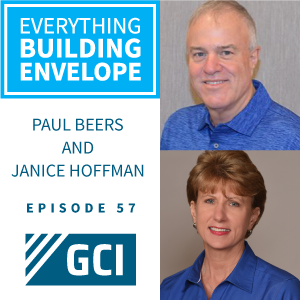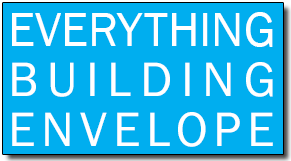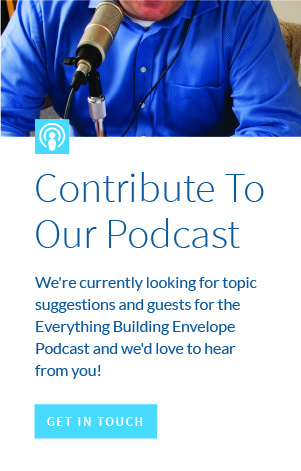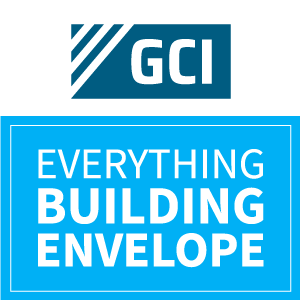
About The Everything Building Envelope Podcast: Everything Building Envelope℠ is a dedicated podcast and video forum for understanding the building envelope. Our podcast series discusses current trends and issues that contractors, developers and building owners have to deal with related to pre and post construction. Our series touches on various topics related to water infiltration, litigation and construction methods related to the building envelope.
https://www.everythingbuildingenvelope.com
*** Subscribe to the show and leave us a Review on ITunes!
Paul: Hello, everyone. Welcome back to the “Everything Building Envelope” podcast. This is Paul Beers, CEO and managing member for GCI Consultants, and I’ll be your host today. We have a really special guest today, Janice Hoffman. Hi, Janice.
Janice: Hey, Paul. How are you today?
Paul: Good. So, Janice works for GCI and she wears many hats. And one of the hats you wear, Janice, is that you’re the producer of the podcast. Are you not?
Janice: Yes, I am. And it’s a pleasure to do so.
Paul: And how many podcasts are we up to now?
Janice: Sixty-five.
Paul: Sixty-five, wow. And, Janice, you’ve done every single one of them, haven’t you?
Janice: I have indeed.
Paul: Yeah. So, one of the other hats that you’ve been wearing recently is related to today’s topic. And what we’re going to talk about is how we’re doing business during and then after the COVID-19 crisis and kind of how we’re going to operate in what I’m calling and others are calling the new normal. So, I know that you’ve been tasked with gathering supplies and whatnot, haven’t you?
Janice: Yes, I have. We’ve been working diligently day after day to look for sources that could provide us with all of the items that we need to keep our technicians and our clients safe on every project that we take on.
Paul: Yeah. So, we’re an engineering firm in the state of Florida and you know, when they had the stay-at-home order and the lockdown and all that, we were actually exempted, one of the types of businesses that were exempted. So, a lot of our construction projects, we kept working. A lot of other things have been postponed or delayed for obvious reasons. We have, however, been inspecting buildings for hurricane damage in Panama City and they actually worked out well up there because…not well for them, but well for us because you know, all these rentals, it was spring break actually, all the rentals ceased to exist and the buildings are basically empty. But we really wanted to protect, make sure it was safe, not only for our employees but also for the people at the properties that we were inspecting and also for everybody to feel comfortable. So, Janice, we actually prepared a document or a protocol for that.
Janice: Yes. Yes, we did.
Paul: The protocol is called COVID-19 Safety Protocol for GCI Inspections and Testing. And we put a lot of thought into this and how we were going to do it. And again, it’s around the safety and well-being of our employees, our clients, occupants of the properties, whatnot. And that’s obviously the top priority with this. And so, the protocol basically follows what the CDC requirements are. We have thermometers and can you tell about what we do as far as making sure everybody’s healthy to start the day, every day?
Janice: When we arrive, the first thing we do is we check with our employees and make sure that if they have any designated symptoms whatsoever, whether they have a fever or cough or shortness of breath, they’re not going to perform inspections until they’re medically cleared. And so, each day they have to go there, they have to take their temperatures and they have to record it on our company Excel sheet that we have in our safety log on our server. So, we are tracking each employee’s designated symptoms on a day in and day out basis in order to keep them and our clients safe.
Paul: Yep. And then we’ve got a specific protocol. Now, this particular application here is for doing inspections in occupied units. And we do that a lot. You know, on hurricane damage, we go in every single unit in the building. If it’s a big condominium with 100 units, our goal is to go into all 100. When we get into expert witness litigation assignments, you know, frequently you end up in occupied units again. So, that’s basically what this is designed for. And so, what the protocol is that we’ve developed a protocol and we’ve done a lot of training with our staff too. In fact, we had training yesterday, didn’t we, Janice? Again.
Janice: Yes. We sure did. We have monthly safety trainings and yesterday was devoted entirely to our safety protocol based on COVID-19 to make sure that…well, it was really a follow-up training and to make sure that everybody is in full compliance across the company.
Paul: And we’re going to keep doing the training over and over just to make sure that everybody’s really focused on safety and doing things the right way. So, the protocol includes maintaining proper distance of six-feet or separation with other employees and anybody else they come into contact with, clients, property occupants, things like that. You can’t have a bunch of people riding together in the elevators. When we go into a unit, our goal is now, this isn’t hard fast, but it’s the general rule of thumb, is that we’re only going to send one inspector into the unit, so you know, reduce the number of people that are in there. And what are they going to be equipped with when they go in, Janice?
Janice: Well, we have assembled kits for all of our inspectors. They’re going to have everything from, well, their thermometers, to their boot covers, to their alcohol wipes. We’ve given them face shields and gloves and hand sanitizers and sealable bags that once they leave the unit, they can put their booties and their gloves inside that sealable plastic bag and put on new before they enter the next unit. And then they have their paper towels and their surface cleaners, and they have a full complete kit of supplies that they take to every location and unit that they’re going to inspect.
Paul: Yes. Well, first of all, they wash their hands coming in and out of every unit. They put the protective gear on. As you said, it was the booties, the face covers, disposable gloves, and then they go in and you know, there’s guidelines for what they do when they go in, they’re not touching their face, they’re not doing things like that. We try to pre-educate the people where we are coming into the units or the property managers and have them open window treatments, move furniture, things like that ahead of time. So, the less that we have to touch, the better when we do our inspection. And another thing that we do before we do the inspection is we clean all of our equipment. We typically use iPads and we may have flashlights, ladders. Those get cleaned going in and coming out of every single unit.
And then when they come out of the unit, they remove and dispose of the shoe covers. Then they remove and they dispose of the gloves and our protocol has an illustration straight from CDC on how to remove and dispose of the gloves. We then wash our hands with soap and water for at least 20 seconds or use the sanitizers if the soap and water is not available. So, it’s a very rigorous and thorough procedure, well, first of all, to facilitate being able to do this because you know, a lot of this stuff is very important. Insurance claims, they’ve got deadlines approaching and things like that and you know, maybe they’re having, say, water intrusion issues. Well, that can’t wait necessarily because there’s other underlying problems that come with that. So, they’ve got to get in and they’ve got to get out in a reasonable amount of time.
Janice: They are also practicing physical distancing, when in these units, if there just so happens to be another person within the unit, but we’ve got that down pat. By now, this is second nature to our technicians at this point, which is really great.
Paul: Yeah. Now, we’ve been doing these inspections all along without incident. We haven’t had any problems with anybody being sick or getting sick. And I think the comfort level has been pretty good. Another thing that we have on our protocol is a hotline number. So, if there’s any questions or concerns, there’s…and Janice, you’re one of the hotline people, one of your many hats.
Janice: I am.
Paul: Yeah. And that there’s an 800 number, a toll-free number that they can call if there’s any concerns or any issues with that where they can basically, you know, get answers or let us know if there is a concern that needs to be addressed. So, our goal is to, you know, continue to be able to provide great service to our clients safely, keep things moving and you know, that kind of comes to the subject of the new normal as we call it. What’s this going to look like going forward? And I think nobody knows. Do you know, Janice?
Janice: No. I really don’t know. But I’m anxious to hear from your conversations you’ve had with people in the industry, what some of the things you might be anticipating.
Paul: Well, you know, there’s certain things are going to be done differently I think forevermore. One thing that’s happened real quickly was everybody’s using Zoom for virtual meetings. So, you know, even when we’re setting up to go into a building, we have a Zoom call and we go over everything and we show them what we’re doing. And I think things like that are probably not going to change for sure. It’s going to be a long time or maybe never that we do away with some of these steps that we’re doing. I mean, it’s just common sense. The washing the hands and cleaning the equipment and you know, I don’t know if we’ll have to use gloves forever, but you know, if we do, we will. We’ve always worn the booties anyway just to keep from tracking dirt. I don’t know about face covers if that lives on, but you know, clearly some of this stuff I think is gonna ultimately make things better for everybody in the long-run just because it’s good practice. We never had to do it before, but you know, maybe it would have been a good idea I guess.
Janice: And now that it becomes second nature, it’s just so much easier just to keep it going and it is just good hygiene and good protection for everyone involved.
Paul: Yeah. So, you know, we’re happy to be able to continue on and do it in a responsible way. If any of the listeners want to…what our safety protocol looks like, Janice, can they get a copy?
Janice: Yeah. They sure can. They can either send an email request to info@gciconsultants.com or I’ll even share my direct line with them, that’s 561-228-4262 and I’d be happy to answer any questions and to email them our protocol as well.
Paul: Great. So, as we continue through the crisis, the next thing that we’re going to do as a company, and we’re not ready to do it yet because there’s not even any CDC guidelines on it, is figure out how we can travel to remote job sites. How we’ve been getting to Panama City by the way, which is 8 to 10 hours away in the car is exactly that way, we’ve been driving up there and we’ve been staying in rental units at the properties that we’re inspecting, so we’re not having to leave and get exposed as few people as possible I guess is the way we would say it. So, you know, as the restrictions continue to be lifted, we’re going to continue to incorporate them into our policies. So, for instance, you know, being able to get on an airplane again, obviously that was something we used to do a lot of and there’s some places like, for instance, Puerto Rico where we’ve got work that’s ready to go but we can’t get there right now, we’re going to need that safety protocol I think is going to be a big part of it going forward. And you know, as I say, the new normal is going to emerge. Sort of see that some of this is going to be part of it and you know, hopefully, sooner rather than later we’ll get through this and be back to the new normal. So, short and sweet. That’s how we’re doing it. Janice, thank you so much for coming on with me today and helping explain what we’re doing and I know that you’ve been very involved in the search for supplies, which is a huge challenge.
Janice: Yes. It’s been a fun endeavor actually because when you think about the safety of our employees and clients and understanding how important it is to all of us going forward, we have had success. So, I’m happy to report that we’ve got backup supplies for all of our inspectors and as their kits run low, we’ll be able to ship them out additional supplies and just keep them running and they’ll keep taking care of our clients. So, we’re in good shape.
Paul: Keeping everybody safe.
Janice: Keeping them all safe. That’s it. That’s the name of the game.
Paul: Yeah. So, I’d like to thank everyone for listening to our podcast today and I invite you to take a further look at GCI Consultants and our services on our website, www.gciconsultants.com. You can also reach us at 877-740-9990 if you have any need for our services, which are related obviously to the building envelope. Thank you once again, and I look forward to talking with you next time on the “Everything Building Envelope” podcast. So long, everyone.


